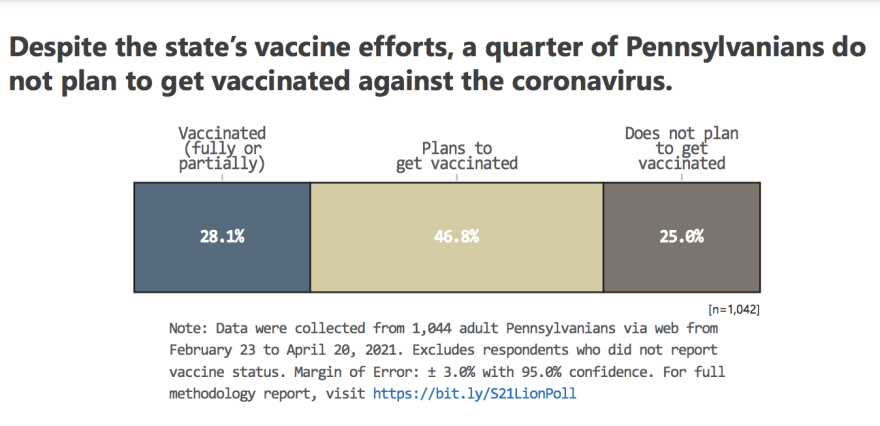All Pennsylvanians 12 and up are now eligible to receive COVID-19 vaccines. But a new Penn State study found one in four Pennsylvanians still don’t plan on getting vaccinated.
The study, led by Penn State Harrisburg researchers, surveyed more than 1,000 Pennsylvanians to learn about vaccine hesitancy – an umbrella term describing those who “probably” or “definitely” will not get vaccinated. They found significant differences between regions and demographics.
Older Pennsylvanians are the least vaccine hesitant, according to the study. Head researcher Tim Servinsky says just 14% of those 65 and older said they don’t plan on getting vaccinated.
“Obviously, that’s great news since we know that older individuals are most vulnerable to hospitalization and more serious symptoms when they contract COVID,” Servinsky said.
In contrast, nearly one third of respondents aged 18-34 said they wouldn’t get vaccinated.
Democrats had the lowest hesitancy among political affiliations. Rural Pennsylvanians, especially those in the state’s southcentral (33.1% hesitant), northeast (32.6% hesitant) and northwest (30.8% hesitant) regions, were more hesitant than urban Pennsylvanians near Philadelphia and Pittsburgh.
Servinsky said vaccine concerns in rural Pennsylvania largely stemmed from respondents' lack of trust in the new vaccines and the governments adniminstering them.
The study also found that Black and Hispanic respondents were each about 35% hesitant – the most of all surveyed races.

Servinsky says hesitancy among communities of color could reinforce existing struggles they face, like access to health care.
“If we’re not able to get information to the different groups [of color], then we’re just going to see continued disproportionality in results,” Servinsky said.
Servinsky says education is needed to address Pennsylvanians’ vaccine hesitancy. He hopes research like his will help keep vaccination rates climbing.
“Using the data in an informed way to make policy-driven decisions and to tailor messaging will be so key to getting us through this,” Servinsky said.






